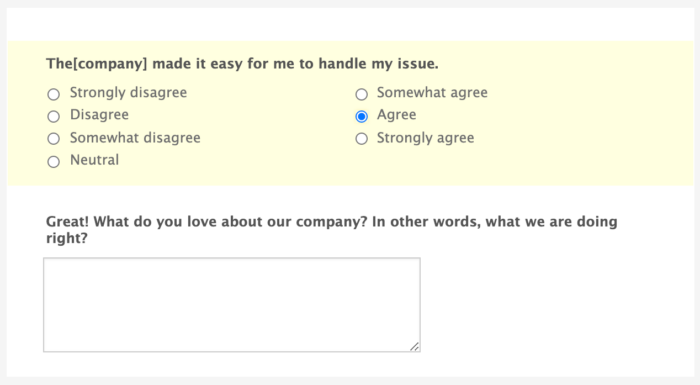One way of collecting customer feedback is to ask customers directly about their experience. You can solicit this information either through your company website or at the time of purchase, whether online or at a physical retail location.
But how do you achieve higher customer satisfaction and repeat business? Try using a specific kind of feedback known as the customer effort score (CES).
Defining CES
Developed by global research firm Gartner, a CES is a single-item metric that measures how much effort a customer has to put into an experience with a particular brand. These interactions include resolving an issue with a customer service agent, buying or returning a product, getting an answer to a question, and more.
The faster and easier you solve a problem for a customer, the better they view their experience with you, and the more likely you are to gain their loyalty.
How CES differs from other customer satisfaction measurements
Brands use many types of service and satisfaction metrics to assess how customers feel about online and in-person brand interactions. One of these is the Net Promoter Score® (NPS®), which examines how likely a customer is to recommend the brand or company.
NPS may be more beneficial for segmenting customers into groups that align with a range of service-based initiatives, while CES examines the overall customer experience.
Other customer feedback systems don’t measure satisfaction in terms of low effort to high effort. However, the effort metric often makes more sense, given that one of the ways customers assess their experience is in terms of how easy or convenient it was to buy a product or use a service across multiple touchpoints.
That’s not to say that companies should use only one metric to assess customer interactions. Relying on several different measurements can provide a clearer picture of what an organization’s customers think after an interaction. For example, a customer service organization like a call center could use CES with other metrics like repeat calls, hangups, and transfers to determine where improvements could be made in customer support.
Pro Tip
Boost the customer experience and achieve higher satisfaction levels with Jotform AI Agents, a powerful automated customer service tool that provides real-time assistance, answers user queries, and guides customers through processes like form-filling and troubleshooting.
Calculating CES
For the CES, customers use a seven-point scale ranging from “very difficult” to “very easy” to rate the effort required to use the product or service. Customers may also measure the likelihood that they’ll repurchase this product or service in the future.
The scale ratings range from one to seven, with one being the number that represents the strongest disagreement with a statement like “the company made it easy to buy from their online store,” or “the company made it easy to get the help I needed.”
On the other end of the scale, seven signifies that a customer strongly agrees with that statement. Typically, a score of four is neutral (neither agree nor disagree). Overall, any score of five or higher is considered positive.
When to use CES
The perfect time to calculate the CES is immediately following any purchase or service interaction. It’s usually best to seek customer feedback as soon as possible since that’s when memories and impressions are the sharpest. Customers’ enthusiasm or frustration will be fresh in their minds so they can provide the most authentic response possible.
Creating CES surveys
It’s easy to gather CES information; just send customers a simple survey.
You can use Jotform’s CES survey template to collect this type of feedback. You’ll be able to customize a simple, preformatted CES survey to meet your business needs. From there, you can collect the necessary information to identify key areas of improvement.
Best practices for building a CES survey include optimizing it for mobile devices since online interactions are increasingly conducted that way. You should also use a tool that automatically sends the survey after an interaction. Finally, ensure you have a way to share the data with those who can take action based on the results.
Net Promoter®, NPS®, NPS Prism®, and the NPS-related emoticons are registered trademarks of Bain & Company, Inc., NICE Systems, Inc., and Fred Reichheld. Net Promoter ScoreSM and Net Promoter SystemSM are service marks of Bain & Company, Inc., NICE Systems, Inc., and Fred Reichheld.






















Send Comment: